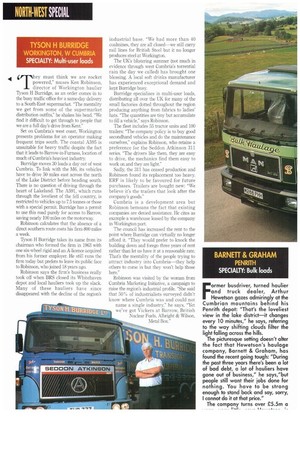TYSON H BURRIDGE
Page 32

If you've noticed an error in this article please click here to report it so we can fix it.
WORKINGTON, W CUMBRIA SPECIALTY: Multi-user loads 4 hey must think we are rocket
powered," muses Ken Robinson, director of Workington haulier Tyson H Burridge, as an order comes in to the busy traffic office for a same-day delivery to a South-East supermarket. "The mentality we get from some of the supermarket distribution outfits," he shakes his head. "We find it difficult to get through to people that we are a full day's drive from Kent."
Set on Cumbria's west coast, Workington presents problems for an operator making frequent trips south. The coastal A595 is unsuitable for heavy traffic despite the fact that it leads to Barrow-in-Furness, location of much of Cumbria's heaviest industry.
Burridge moves 30 loads a day out of west Cumbria. To link with the M6, its vehicles have to drive 50 miles east across the north of the Lake District before heading south. There is no question of driving through the heart of Lakeland. The A591, which runs through the loveliest of the fell country, is restricted to vehicles up to 75 tonnes or those with a special permit. Burridge has a permit to use this road purely for access to Barrow, saving nearly 100 miles on the motorway.
Robinson calculates that the absence of a direct southern route costs his firm 800 miles a week.
Tyson H Burridge takes its name from its chairman who formed the firm in 1963 with one six-wheel rigid and an A-licence acquired from his former employer. He still runs the firm today but prefers to leave its public face to Robinson, who joined 18 years ago.
Robinson says the firm's business really took off when BRS closed its Whitehaven depot and local hauliers took up the slack. Many of these hauliers have since disappeared with the decline of the region's industrial base. "We had more than 40 coalmines, they are all closed—we still carry rail lines for British Steel but it no longer produces steel at Workington.
The UK's blistering summer (not much in evidence through west Cumbria's torrential rain the day we called) has brought one blessing. A local soft drinks manufacturer has experienced exceptional demand and kept Burridge busy.
Burridge specialises in multi-user loads, distributing all over the UK for many of the small factories dotted throughout the region producing anything from fabrics to ladies' hats. "The quantities are tiny but accumulate to fill a vehicle," says Robinson.
The fleet includes 55 tractor units and 100 trailers: "The company policy is to buy good secondhand vehicles and do the maintenance ourselves," explains Robinson, who retains a preference for the Seddon Atkinson 311 series "The drivers like them, they are easy to drive, the mechanics find them easy to work on and they are light."
Sadly, the 311 has ceased production and Robinson found its replacement too heavy. ERF is likely to be favoured for future purchases. Trailers are bought new: "We believe it's the trailers that look after the company's goods" Cumbria is a development area but Robinson bemoans the fact that existing companies are denied assistance. He cites as example a warehouse leased by the company in Workington port.
The council has increased the rent to the point where Burridge can virtually no longer afford it. "They would prefer to knock the building down and forego three years of rent rather than let us have it at a reasonable rate. That's the mentality of the people trying to attract industry into Cumbria—they help others to come in but they won't help those here."
Robinson was visited by the woman from Cumbria Marketing Initiative, a campaign to raise the region's industrial profile, "She said that 50% of industrialists surveyed didn't know where Cumbria was and could not name a single industry," he says, "Yet we've got Vickers at Barrow, British Nuclear Fuels, Albright & Wilson, Metal Box."
















































































